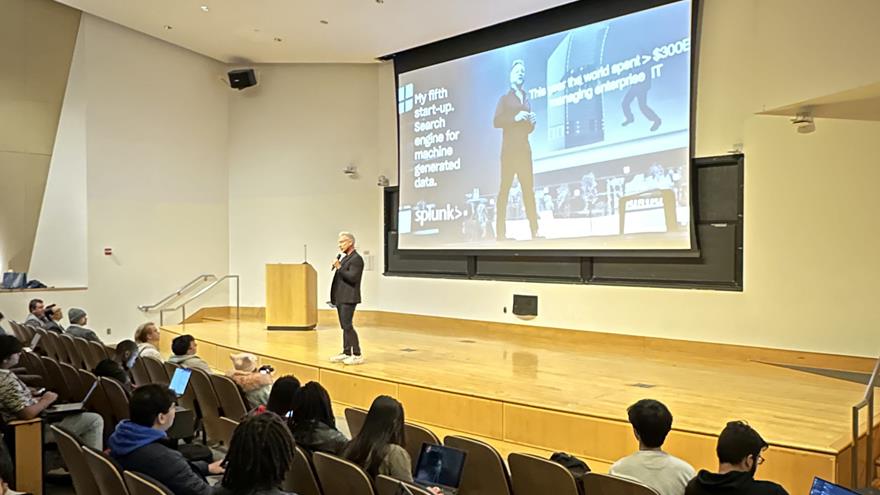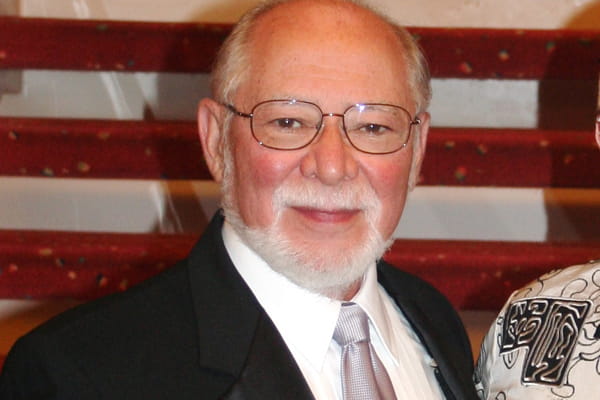Six Decades at Drexel

- Splunk Founder Michael Baum ’85 Shares Personal Philosophies, Entrepreneurial Advice and the Impact of His Drexel Co-ops
- Wireless Sensors Open New Possibilities for Monitoring of Bridges
- Drexel University First-Year Building New Rover
- COVID Radar: Genetic Sequencing Can Help Predict Severity of Next Variant

Dr. Edwin Gerber, assistant head of Electrical and Computer Engineering (ECE) at Drexel, has two rules of thumb when it comes to sustaining a long academic career.
“Don’t die and don’t resign,” he said. “It’s that simple.”
In February, Gerber celebrated his 60-year anniversary at Drexel. His story begins in 1953 when he started in the Electrical Engineering Department as an undergrad. It was as a senior at South Philadelphia High School that Gerber knew he wanted to pursue electrical engineering. A self-described “homeboy,” Gerber liked Drexel’s close-to-home location, its co-op program and its reputation as one of the best engineering schools in the area.
As a senior at Drexel, Gerber was offered a permanent teaching position in the electrical engineering department upon completion of his coursework. “My co-op experience at Drexel showed me that I didn’t want to work in industry—I didn’t want to have to punch a clock and I knew I wouldn’t be doing that in the university environment. And I still love that. I do my job but I do it on my time,” he said. Fifty-five years later, Gerber holds the distinguished title as Drexel’s longest-tenured professor.
Gerber has certainly seen the University grow, since he’s been here for half of its existence. “When I was a student, we had only four buildings, now we have about 55 on the Main Campus,” he said.
Drexel’s curriculum and programs have also undergone significant changes in Gerber’s time.
“In 1985, Drexel required all students to have a computer, and Drexel was the first university to use Mac computers,” he said. “I’ve also seen incredible growth in the number and variety of programs such as law, medicine, film, design, etc.”
During his career, Gerber has had his own share of “firsts.” When he was first hired, he was asked to develop a new electric circuits laboratory for the department. When he started in the summer of 1957, the electronics lab was a vacuum-tube lab. In the 1960s, he introduced semiconductors to the lab experiments; first, transistors replaced the vacuum tubes, and then P-N junction diodes, LED optical systems, Hall magnetic devices, operational amplifiers, microprocessors and, finally, personal computers (Commodore PET and later the Apple Mac) were incorporated into the various lab courses. Over his 55 years in the department, Gerber continued to improve the labs and courses.
Also in the 1960s, Gerber developed two new standalone electronics laboratory courses that are still taught today, along with many of the experiments he developed. Gerber also developed Drexel’s first Computer Logic course and lab. While Drexel now teaches a modern version of the original course, the same lab components are used.
Later, in the 1980s, Gerber developed three of four new laboratory courses still taught in the Electrical and Computer Engineering curriculum. Around that time, he was awarded an NSF grant to introduce computers into the engineering laboratory courses. He developed programs to perform computer-controlled electrical measurements, calculations, analysis and graphs of these results. A complete set of 100 measurements, calculations and graphics were produced in about one minute using the computer system—these results would take hours to produce by hand. This was the first of its kind in an undergraduate curriculum in the nation, if not the world, he said.
Last year, Gerber and three ECE seniors developed a software program that performs computer-controlled curve graphing of electronic devices, such as transistors. The system uses equipment that already exists in all of the department’s 30 lab stations and replaced two 30-year-old instruments that often didn’t work. It would have cost a minimum of $120,000 to purchase 30 new commercial systems—but the work of Gerber and his students came at no cost to the department or the University.
During his 55-year tenure in the ECE department, Gerber has taught over 25 different undergraduate and graduate courses, both day and evening, and developed seven Drexel lab courses. Outside of a one-year leave for a NSF research fellowship and a six-month sabbatical, Gerber has taught all four quarter for 50 years. Recently, however, Gerber has been taking the winter term off to travel in Florida with his wife, Judy, but continues to teach full-time for three quarters a year.
Gerber recently earned a new title as one of Drexel’s most distinguished alumni with his induction into the Drexel 100, the University’s alumni hall of fame. Drexel bestows this highest level of alumni recognition on a small, select group of graduates whose lifetime achievements have brought great honor to the University.
In This Article
Drexel News is produced by
University Marketing and Communications.